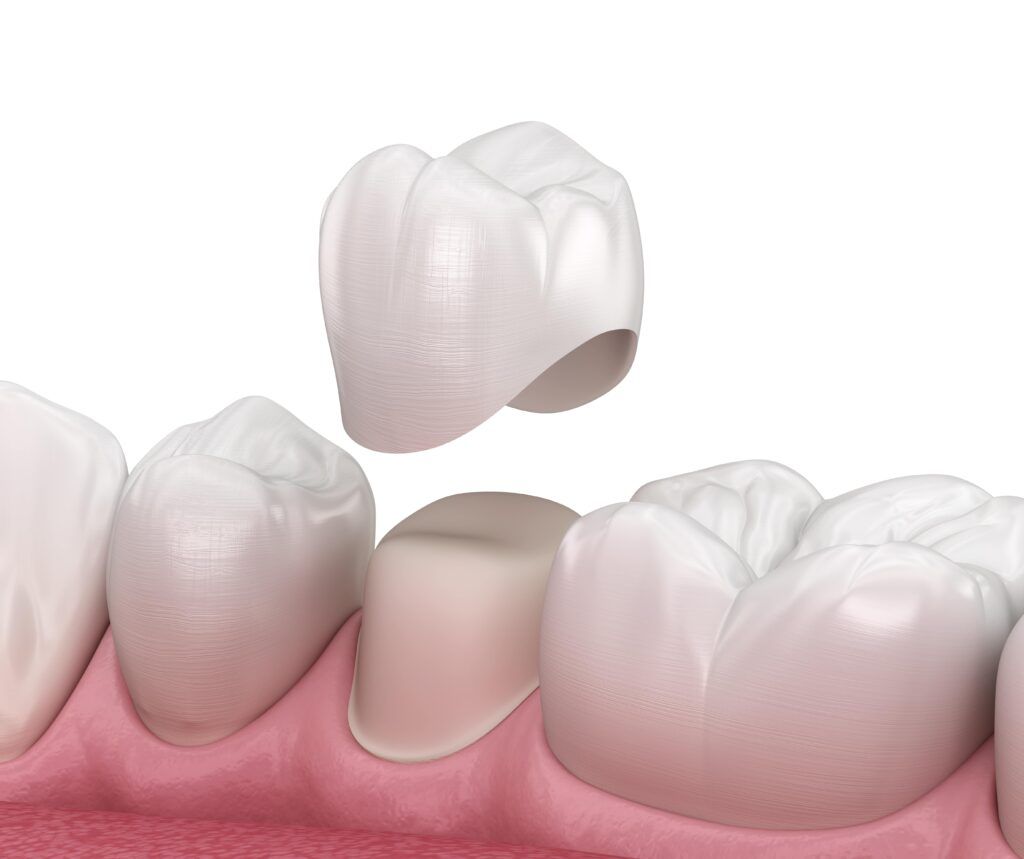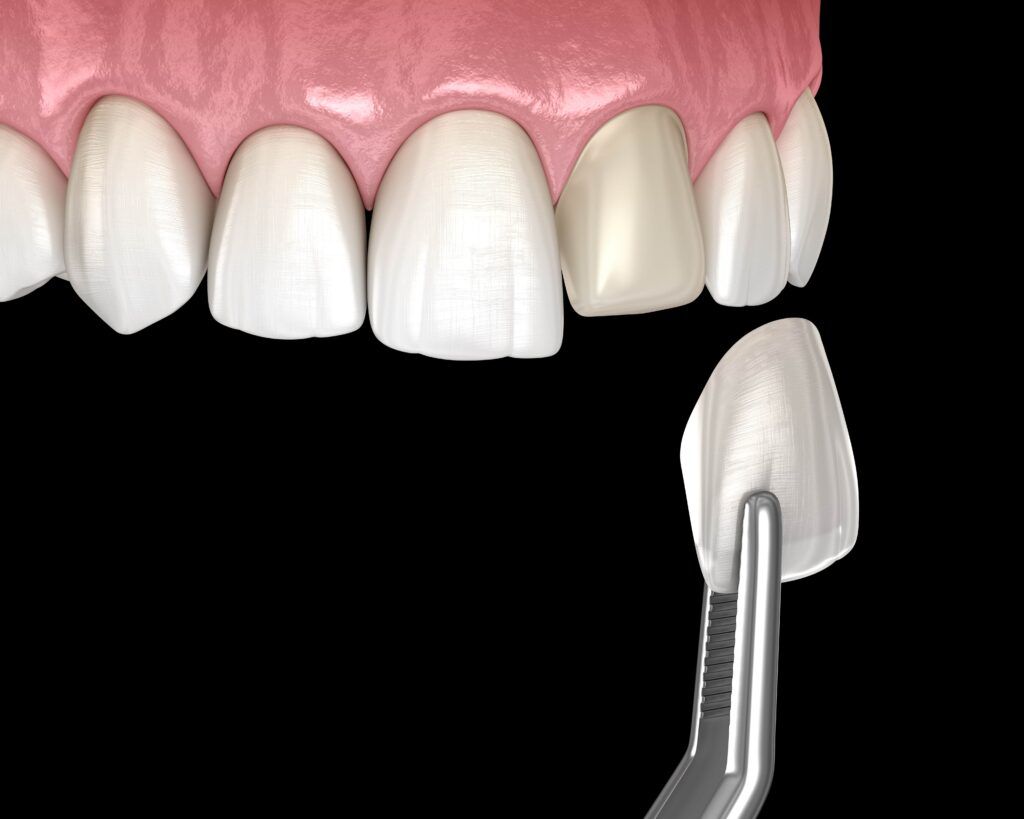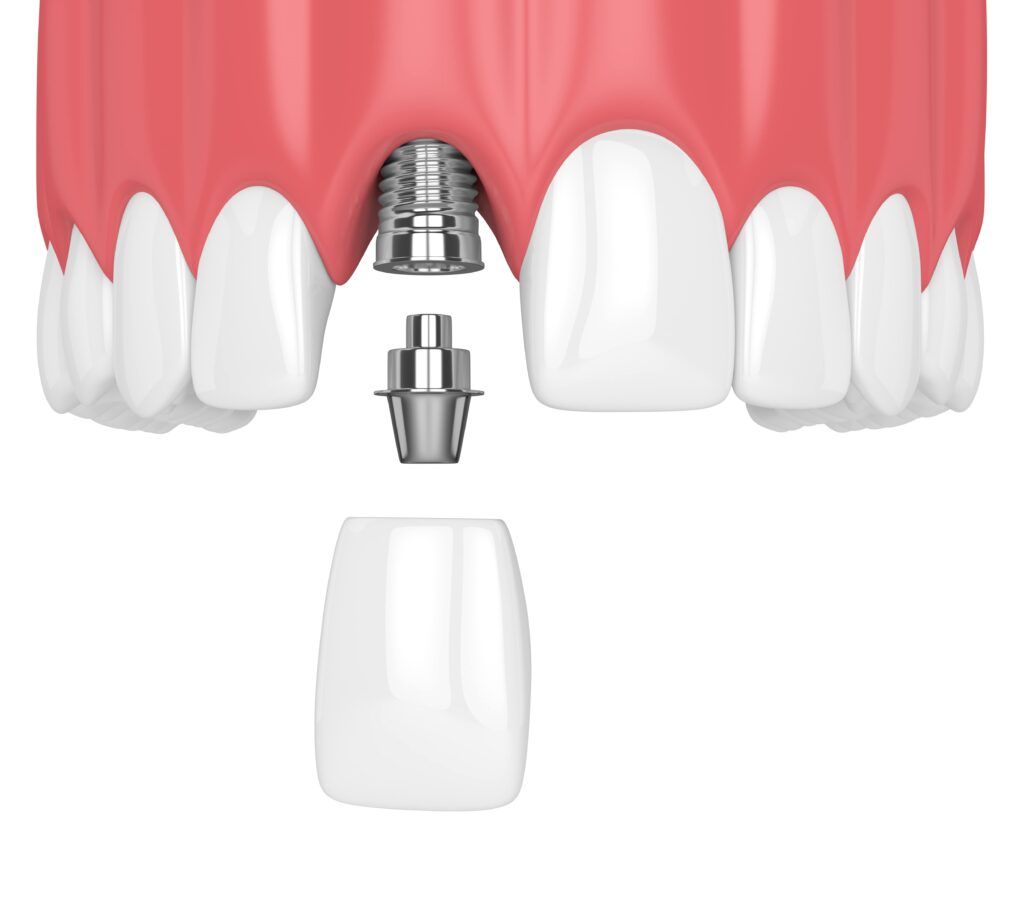Dental health is not only about maintaining a healthy smile but also about enhancing the aesthetics and functionality of your teeth. Among the various dental treatments available, dental crowns, veneers, and implants stand out for their ability to restore and beautify teeth. Each of these treatments serves different purposes and is suitable for different dental conditions. This guide will help you understand what these treatments are, how they compare, and how to decide which one is right for you.
Dental Crowns: The Protective Caps
Dental crowns, often referred to as “caps,” are restorative devices used to cover or “cap” a damaged tooth, enhancing its shape, size, strength, and appearance. Crowns are custom-made to fit over the entire tooth, starting from the gum line, thereby restoring the tooth’s natural appearance and function. They are a versatile treatment option, offering both cosmetic and restorative benefits. Here’s an in-depth look at dental crowns, how they work, and when they are typically recommended by dentists.
How Crowns Work
The process of getting a dental crown typically involves a few key steps:

- Examination and Preparation: Initially, the dentist examines the tooth to determine if it can support a crown, followed by X-rays to check the roots of the tooth and surrounding bone. If the tooth is severely damaged or decayed, it may require a root canal treatment before placing a crown.
- Tooth Reshaping: The tooth receiving the crown is reshaped along the top and sides to make space for the crown itself. The amount removed depends on the type of crown used. All-metal crowns are thinner and require less tooth structure to be removed than porcelain or porcelain-fused-to-metal crowns.
- Impression: After reshaping, an impression of the tooth (and surrounding teeth) is made to ensure the crown will fit seamlessly into your bite. This impression can be made using a digital scanner or traditional dental putty.
- Temporary Crown: A temporary crown is often placed over the tooth to protect it while the permanent crown is being made in a dental lab, which can take a few weeks.
- Permanent Crown Placement: Once the permanent crown is ready, the temporary crown is removed, and the new crown is adjusted as needed to ensure a proper fit and bite. The crown is then cemented into place, fully encasing the tooth.
When Crowns Are Recommended
Dental crowns are recommended for a variety of situations, primarily to:
- Restore a Damaged Tooth: Crowns are often used to restore a tooth that has been significantly damaged by decay, wear, or trauma, helping to protect it from further damage.
- Cover a Dental Implant: Crowns can serve as the top part of a dental implant, providing a functional and aesthetic replacement for a missing tooth.
- Anchor a Dental Bridge: Crowns are used at either end of a dental bridge to fill in the gap left by one or more missing teeth.
- Improve Appearance: Crowns can be used to cover misshapen, severely discolored, or misaligned teeth, enhancing the cosmetic appearance of your smile.
- Protect a Weak Tooth: For teeth that are weakened, cracked, or at risk of breaking, crowns provide reinforcement and prevent further damage.
- Following a Root Canal: Teeth that have undergone root canal treatment are more fragile and may require a crown to protect and restore them.
Crowns are made from various materials, including porcelain, ceramic, metal alloys, composite resin, or a combination of materials. Porcelain or ceramic crowns are popular for their natural color match, making them an excellent choice for front teeth, while metal alloys are typically used for their strength and durability on back teeth.
The decision to use a dental crown involves considering the condition of the tooth, aesthetic goals, and functional requirements. Your dentist will evaluate your specific situation to determine if a crown is the most appropriate treatment to meet your needs, ensuring that your smile is both healthy and beautiful.
Veneers: The Aesthetic Enhancers
Veneers are a highly popular cosmetic dental treatment that significantly enhance the appearance of your smile. They consist of very thin shells of tooth-colored materials, typically porcelain or composite resin, which are custom-made to fit over the front surface of your teeth. Veneers are renowned for their ability to mimic the natural appearance of enamel, offering an immediate transformation in the look of your smile. Here’s a detailed look at veneers, how they work, and when they are recommended by dentists.
How Veneers Work
Veneers work by covering the visible front surface of the teeth with a layer of custom-made, tooth-colored material. This process involves:

- Consultation and Planning: Initially, you’ll have a consultation with your dentist, where you discuss your aesthetic goals. The dentist might take X-rays or make impressions of your mouth and teeth to create a precise treatment plan.
- Preparation: To prepare your teeth for veneers, the dentist removes a small amount of enamel from the front surface. This is typically about 0.5 millimeters, which is almost equal to the thickness of the veneer to be added. This step is essential for the veneer to fit correctly and look natural.
- Impression and Customization: After preparing the teeth, the dentist takes an impression of your teeth, which is sent to a dental lab where your veneers are custom-made. This process can take a few weeks, during which temporary veneers may be placed.
- Bonding: Once your veneers are ready, the dentist will temporarily place them on your teeth to examine their fit and color, making any necessary adjustments. The teeth are then cleaned, polished, and etched to allow for a strong bonding process. A special cement is applied to the veneer, which is then placed on your tooth. Once properly positioned, the dentist will apply a special light beam to the veneer, which activates chemicals in the cement, causing it to harden quickly.
When Veneers Are Recommended
Dentists recommend veneers for various reasons, primarily aimed at improving the aesthetic appearance of your teeth. Some common situations include:
- Discoloration: Veneers are ideal for teeth that have significant staining or discoloration that can’t be corrected with whitening procedures, including stains from tetracycline or other drugs, root canal treatment, or large resin fillings.
- Wear and Tear: Teeth that are worn down from use or grinding (bruxism) can be restored to their original appearance with veneers.
- Chips or Cracks: Minor chips and cracks in the teeth can be effectively concealed with veneers, improving the overall look of your smile.
- Misalignment or Gaps: For teeth that are slightly misaligned, uneven, or have gaps between them, veneers offer a cosmetic solution to create a more uniform and closely spaced appearance.
- Shape and Size: Veneers can be used to alter the shape or size of teeth, making them appear more proportionate and aesthetically pleasing.
Veneers are a versatile and minimally invasive option for transforming your smile. They are especially suited for individuals looking for a durable and less intrusive alternative to crowns or braces for cosmetic purposes. However, not everyone is a candidate for veneers, as they require healthy teeth and gums for the best outcomes. Your dentist will evaluate your specific situation and discuss whether veneers are the most suitable option for achieving your desired results.
Dental Implants: The Foundation for Replacement Teeth
Dental implants are a state-of-the-art tooth replacement solution that offers a permanent foundation for fixed (permanent) or removable replacement teeth. Designed to mimic the structure of natural teeth, implants consist of two main components: a titanium post that serves as a substitute for the tooth root, and a crown that is attached to the top of the implant to replicate the visible part of the tooth. Dental implants are celebrated for their strength, durability, and the seamless way they integrate into the natural architecture of the mouth, making them an increasingly popular choice for individuals looking to restore their smile.
How Dental Implants Work
The process of getting dental implants involves several steps, typically carried out over a few months:

- Initial Assessment: A dentist or oral surgeon conducts a thorough examination, including X-rays and sometimes 3D images, and reviews the patient’s medical history to determine if implants are suitable. Suitable candidates need to have adequate bone density and a healthy gum to support the implant.
- Implant Placement: The dental implant, a small titanium post, is surgically placed into the bone socket of the missing tooth. Titanium is chosen for its ability to fuse with bone, a process known as osseointegration, which can take several months. During this time, the implant securely anchors itself to the jawbone.
- Abutment Placement: Once the implant has bonded with the jawbone, a small connector post called an abutment is attached to the post to securely hold the new tooth. In some cases, the implant and abutment can be placed simultaneously.
- Crown Attachment: After the gum tissue has healed around the abutment, impressions of the teeth and gums are made, and the final tooth or teeth are created. A crown, custom-made to match the patient’s natural teeth, is then attached to the abutment.
When Dental Implants Are Recommended
Dentists recommend dental implants for various reasons, including:
- Replacing One or More Missing Teeth: Implants can be used to replace a single tooth, several teeth, or all of the teeth. They are an alternative to dentures or bridges.
- Preventing Bone Loss: Following tooth loss, the jawbone can begin to atrophy due to the lack of stimulation. Implants mimic the stimulation provided by natural tooth roots, helping to preserve the bone and maintain facial structure.
- Improving Oral Health: Unlike bridges, which require reducing adjacent teeth, implants do not require altering other teeth, thus preserving more of the patient’s natural tooth structure. Furthermore, implants make it easier to maintain good oral hygiene, reducing the risk of periodontal disease.
- Enhancing Comfort and Confidence: Implants are securely anchored and do not slip or move, offering a level of comfort and security that traditional removable dentures cannot match. They also improve speech and make eating easier compared to other tooth replacement options, enhancing the patient’s overall quality of life.
- Cosmetic Improvement: Dental implants look and feel like natural teeth. They restore and can even enhance the appearance of a patient’s smile, boosting self-esteem and confidence.
Ideal candidates for dental implants should have good general and oral health, adequate bone in the jaw to support the implant, and healthy gum tissues free of periodontal disease. Dental implants are especially useful for patients who find removable dentures unsatisfactory or uncomfortable. Due to the complexity and multiple stages involved in the procedure, a detailed consultation with a dental professional is essential to determine whether dental implants are the right choice for an individual’s specific needs.
Comparing Dental Crowns, Veneers, and Implants
Here’s a comparison table that outlines the key differences between crowns, veneers, and dental implants based on various aspects:
| Aspect | Crowns | Veneers | Dental Implants |
| Primary Use | Restoring damaged or decayed teeth | Cosmetic improvement of the smile | Replacing missing teeth |
| Material | Porcelain, Ceramic, Metal, Composite Resin | Porcelain or Composite Resin | Titanium (implant), Various (crown) |
| Procedure Complexity | Moderate (2-3 visits) | Moderate (2-3 visits) | High (multiple stages over several months) |
| Durability | 5-15 years, with proper care | 7-15 years, with proper care | Over 25 years, with proper care |
| Aesthetic Improvement | High (especially porcelain/ceramic) | Very High (mimics natural tooth enamel) | High (crown can be made to match natural teeth) |
| Tooth Structure Removal | Significant (entire tooth surface) | Minimal (front surface of the tooth only) | None (replaces entire tooth) |
| Ideal For | Damaged, decayed, or severely worn teeth | Discolored, slightly misaligned, or gapped teeth | One or more missing teeth |
This table provides a clear overview of how crowns, veneers, and dental implants compare across different dimensions, helping to guide individuals in choosing the right dental treatment based on their specific needs and conditions.
Deciding Which Treatment is Right for You
Choosing between dental crowns, veneers, and implants depends on several factors, including the condition of your teeth, your cosmetic goals, and your overall dental health. Here are some considerations to help you make an informed decision:
Assess Your Dental Needs:
If you have damaged or weakened teeth, crowns might be the best option. For cosmetic improvements, veneers could be ideal. If you’re missing one or more teeth, implants are likely the best solution.
Consult with a Dentist:
A dental professional can evaluate your oral health and recommend the most suitable treatment based on your specific condition and goals.
Consider the Longevity and Maintenance:
Think about the long-term care and maintenance each option requires. While implants are more durable and can last a lifetime with proper care, crowns and veneers also offer considerable longevity if maintained well.
Budget and Insurance Coverage:
Consider your budget and what your insurance covers. Dental implants tend to be more expensive, but they are a long-term investment in your oral health.
Conclusion
In conclusion, while dental crowns, veneers, and implants each offer unique benefits for enhancing and restoring your smile, the best choice depends on your individual dental needs, goals, and overall oral health. Crowns provide a robust solution for damaged or decayed teeth, offering protection and strength to the entire tooth structure. Veneers, on the other hand, are ideal for cosmetic improvements, offering a less invasive way to achieve a brighter, more uniform smile by addressing issues like discoloration, minor misalignments, and gaps. Dental implants represent a more comprehensive solution for missing teeth, preserving jawbone health and providing a stable, long-lasting foundation for replacement teeth. By consulting with a dental professional, you can determine which treatment aligns best with your specific situation, ensuring that you receive the most appropriate and effective care to achieve a healthy, confident smile.

